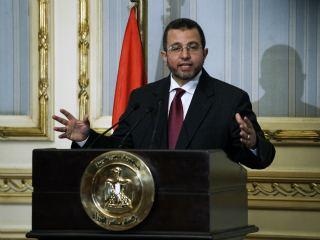CAIRO: Muslim Brotherhood detainees Mohamed Hussein and Khayrat El Shater have both developed serious and possibly life-threatening illnesses in prison, according to Brotherhood sources and family members.
The regime has so far refused to provide the men with appropriate medical treatment, they say, blaming the unhygienic conditions of Tora prison and its hospital for the deterioration of their health.
Family members say they want the men released to house arrest, which has been allowed for some high-profile detainees in the past. But the government seems unlikely to acquiesce to their demand.
Hussein, a member of the group’s Executive Bureau, suffered what Brotherhood sources call “an acute heart attack and was rushed to Qasr Al Aini Hospital, where doctors inserted a diagnostic catheter while he was handcuffed to the operating table.
Officials at Qasr Al Aini could not be reached for comment at press time, and his prognosis is unclear.
Hussein was detained last week in Giza en route to an appointment at Cairo’s Dar El Fouad Hospital, where he was to be treated for a chronic heart condition.
“He needed to go to the hospital and instead he went to prison, said Ibrahim El Houdaiby, director of Ikhwan.net.
“When he was taken to prison the police would not let him see a doctor or get any medicine, he added. “When you are put in jail in bad conditions and put under a lot of pressure, of course that could lead to a heart attack, [especially] when someone has a pre-existing condition.
El Shater, who has been detained since last December and is currently standing trial before a Cairo military court, is a diabetic who suffers from high blood pressure and chronic heart problems.
As a consequence of high blood sugar, he has developed a severe and painful infection in his leg. His family fears that without immediate medical attention his leg may have to be amputated. His daughter Zahraa El Shater says that her father’s condition has been exacerbated by the dirty and overcrowded conditions in which he is being held. The prison hospital where he is being treated is even worse, she says.
“He is being held in a very narrow cell with three other men and it is so small that they can’t even pray, she says. ” But the hospital in the prison is even dirtier and worse than the prison itself. We would rather he stay in that cage then be sent to that dirty hospital.
In addition to unsanitary conditions, Brotherhood sources say that prison doctors are not trained to treat diabetics and would not know how to deal with an advanced infection.
Members of El Shater’s family have tried to get specialists to travel to the prison to treat their father, but say they have found no one willing to treat a detained political prisoner.
“Many of them are afraid to go to with us to treat a Muslim Brotherhood detainee, says Zahraa El Shater. “People are afraid to go to the prisons when they don’t have to because they are afraid that the police with take their ID number and cause trouble for them later.
“Even at my sister’s wedding last month, the police surrounded the whole place and took everyone’s ID number, she adds. “Later they called people and asked why they came to a Brotherhood wedding.
El Shater’s family is calling for the regime to release him in to house arrest, where he could more easily be treated by specialists. They point out that other high-profile detainees who have been tried before military courts in recent years, such as Talaat El Sadat, have been allowed to remain in their homes throughout the trial.
“He is a well known person, he will not [try to] run away, says Zahraa.
“Prison is a very dirty place and is not suitable for a sick man, she adds. “His situation is critical now. I just want him to get good medical care quickly and get some good medicine.
The Brotherhood is Egypt’s most influential opposition group. It holds 88 seats in the 454 member People’s Assembly, which it won during a brief period of political opening that coincided with elections in the fall of 2005.
More than 600 members of the group, including top leaders such as El Shater and Hussein, have been detained since December.
El Shater is one of 40 currently being tried for money laundering and membership of a banned organized before a military court, which is empowered to sentence them to death without appeal.
He was referred to a military court by special order of President Mubarak, after he was acquitted four separate times by civil courts.
Hussein has been charged with membership of a banned organization and working against the public interest, although no trial date has been set.
The arrests began after a kung-fu themed demonstration by students in an MB youth group at Al-Azhar University, which the regime condemned as a militia exercise.
Brotherhood sources argue that the recent wave of arrests are in response to the group’s plans to register as an official political party, in defiance of constitutional amendments passed in March that forbid political activity based on religion.


